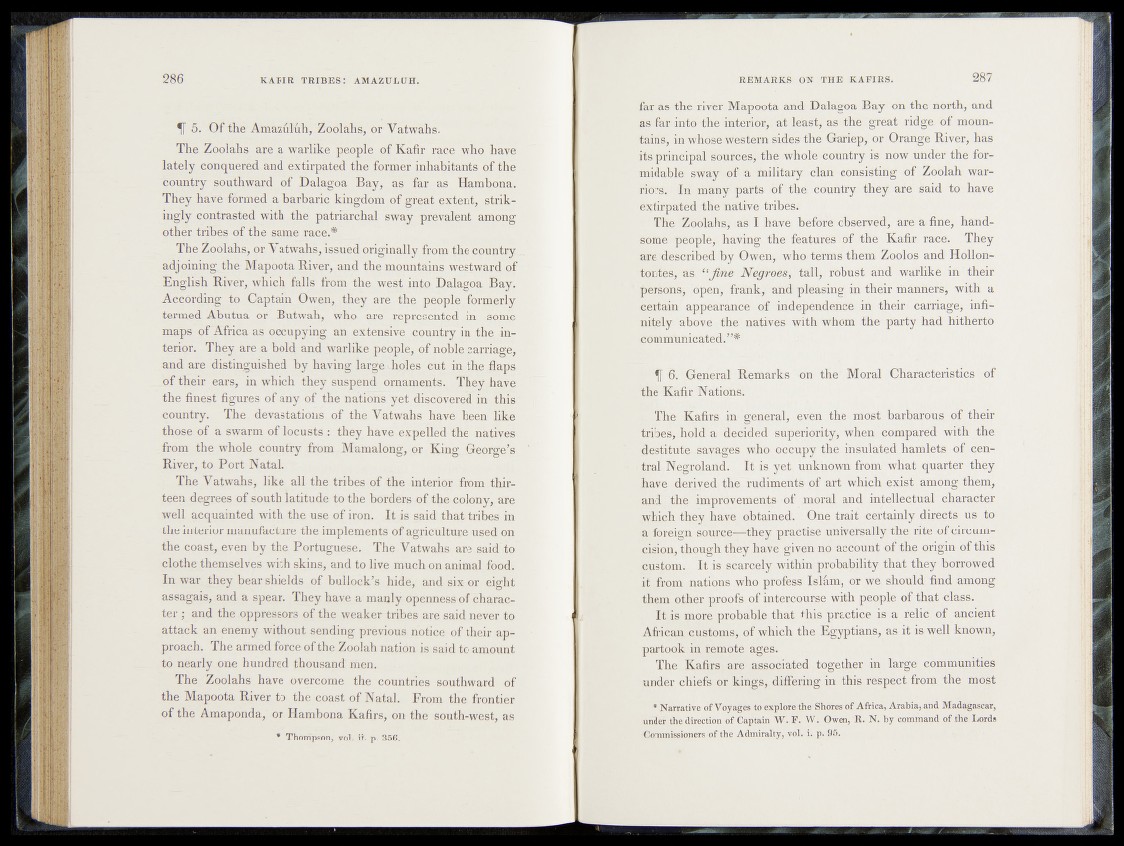
5T 5. Of tile Amazulfih,. Zoolahs, or Vatwahs.
The Zoolahs are a warlike people of Kafir race who have
lately conquered and extirpated the former inhabitants of the
country southward of Dalagoa Bay, as far as Hambona.
They have formed a barbaric kingdom of great extent, strikingly
contrasted with the patriarchal sway prevalent among
other tribes of the same race.*
The Moolahs, or \ atwahs, issued originally from the country,
adjoiningjthe MapootaRiver, and the mountains westward of
English River, which falls from the west into Dalagoa Bay.
According to Captain Owen, they are the people, formerly
termed Abqtua or Butwah, who are represent^” in. ;sqni£
maps of Africa as occupying an extensive country in the interior.
They are a bold and warlike people, of noble^carriage,
and are distinguished by having large thpjes cut in the flaps
of their ears, in which they suspend ornaments. They have
the finest figures of any of the nations yet discovered in this
country. The devastations of the Vatwahs have been* like
those of a swarm of locusts : they have expelled the natives
from the whole country from Mamalong, or King .George’fk
River, to Port Natal.
The Vatwahs, like all the tribes of the interior from thirteen
degrees of south latitude to the borders of the colony, are
well acquainted with the use of iron. It is said that tribes in
the interior manufacture the implements of agriculture used on
the coast, even by the Portuguese. The Vatwahs are said ito
clothe themselves with skins, and to live much on animal food.
In war they bear shields of bullock’s hide, and six- or eight
assagais, and a spear. They have a manly openness of character
; and the oppressors of the weaker tribes are said never to
attack an enemy without sending previous notice of their approach.
The armed force of the Zoolah nation is said to amount
to nearly one hundred thousand men.
The Zoolahs have overcome the countries southward of
the Mapoota River to the coast of Natal. From the frontier
of the Amaponda, or Hambona Kafirs, on the south-west, as
Thompson, vol. it. p. 356.
far asftjië»»river.Mapoota arick D&la'goa Bay'on the north, and
as l^^étVrthe »tariff, ’ a|%lÿ^t|las;i',the''rgreat rid J||jof mountains,
«in v hô^i^e^t’ern gddes‘tk&0^riep',| or t Orange Rive% has
its principal éouM^ptl'e v holw%®ntry is now. under the formidable
swaÿfeàfèô militar^clhb^ofiSiltin^wif Zoolah- warriors^
' In many -parts ,b£'H%e,\couritry they are' said to have
èxtirpa'ted pie
The Zoolkfi%.^afe I have beforfeobserved, are a fige^ handsome
^people, having th^f^feufes'of ^the Kafir rà'cé^ They
are described by Gwen^^wh^pfeas theüx ,Z^*êfe^and Ilollom-
tontes, as 1fine Negroes, tall, robbst-taAd warl&enih5 their
|>er sons^fcpenr frank, and pteasing. indtheir manners* with a
certain appearanee\©f independence in their ^afria^e)rinfi-
nite'ly aboyé*. the natives with whom the party had hitherto
communicated.”*
^ 6. General Remarks on thè' Moral Characteristics , of
the Kafir Natibaft^l’
i The Kafirs invgeneral, even, the |KiYjst barbarou^,^'tlieir
tribes,.hold a decided superiority, whenfebmpared with the
destitute sayages who occupy the insulated^hamlet»? of central
Negroland. It is yet unknown from what quarter they
have derived thë^udiments of art which^cxi^t- am^pr them,
and fhte improvements of moral and intellectual character
which they have obtained. One trait .certainly directs us tp
a foreign source—-they practise universally’the ritès^gifcum-
cision, though they have giyen no1 account of the of this
custom. It is scarcely within probability, that they b.bfro%ed
it from nations who profess Islhm, or- we^liouid find among
them other proofs of intercourse with people of th a t'M ^ è ^
It is more probable that this practi&^is ' of ancien fc
African customs, of which the Egyptians, as ibis well known,
partook in remote ages.
The Kafirs are associated together im. large communities
under chiefs or kings, differing in this respect, from the most
* Narrative of Vtiÿages to explore the'Shtires of Africa, Aiâbiâ, and Madagascar,
under the direction of Captain W. F. W. Owen, R. Nktjÿ command of the Lord»
Commissioners of the Admiralty, vol. i. p. 95.